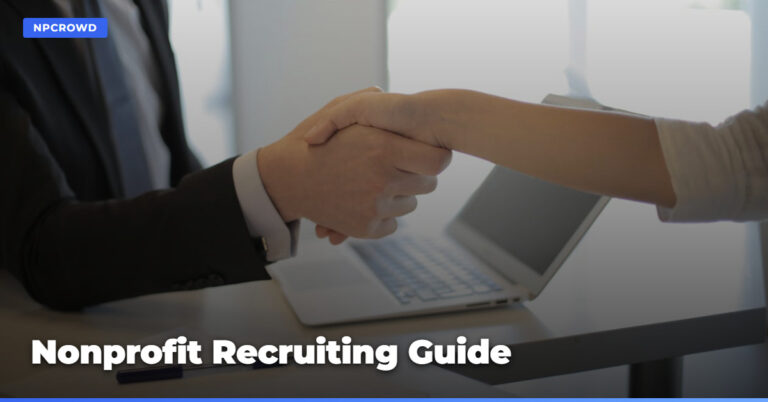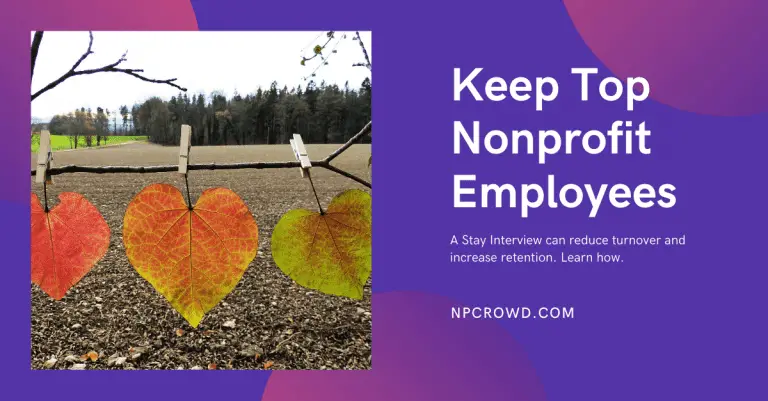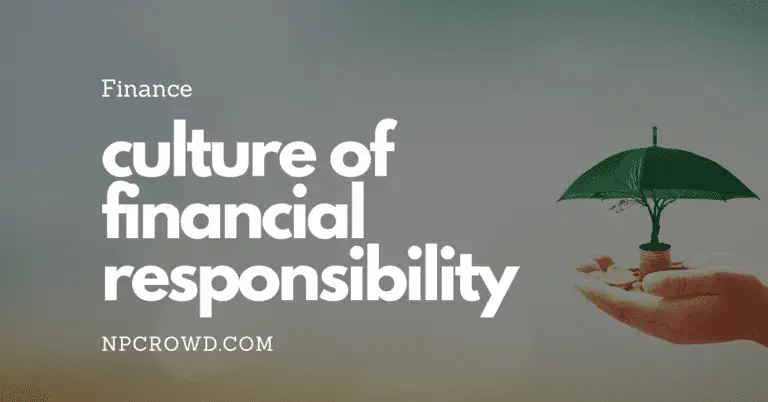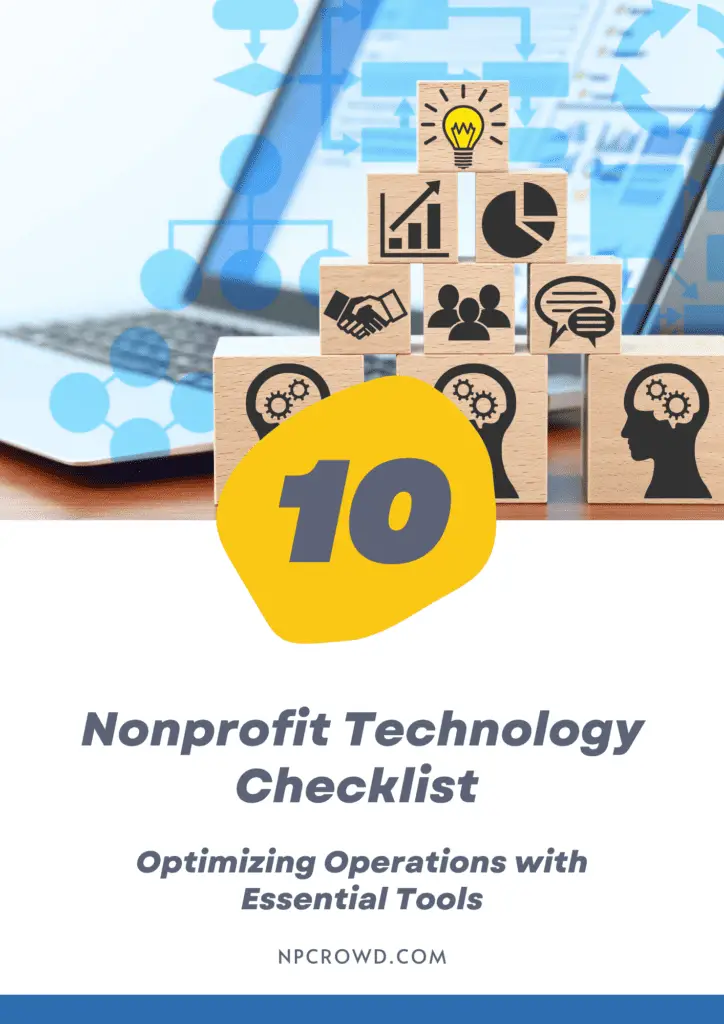Top 8 Nonprofit Leadership Skills You Must Have: Leadership Development
Disclaimer: This post may contain affiliate links. These links, if used and purchases made, we may earn a small commission. These affiliate programs do not impact the recommendations we make or the resources we refer you to. Our focus is on providing you the best resources for your nonprofit journey.
Introduction
To stay relevant and, frankly, solvent, you and your organization must invest today in nonprofit leadership development.
According to MissionBox, nonprofit sector organizations filled only 43% of their executive C-suite nonprofit positions. That’s a whopping 67% of positions that remain unfilled. We could anticipate that is a large number of respondents without executive leadership.
Is this because most people do not want to lead others in a nonprofit organization? Probably not. Instead, we suggest it is a lack of intentional succession planning and leadership development found in most nonprofits. It’s time to change that, even if you are an accidental second-chair leader.
Now, we are not talking about nonprofit leadership styles alone, but actually skill and knowledge development as well. Let’s take a look.
Why is executive leadership development needed in nonprofits?
40% of externally hired executives fail within 18 months. Additionally, it takes 12-14 weeks to hire critical nonprofit leadership positions.
Our experience is that if personal networks alone do not surface a candidate quickly, these searches can drag on for over six months. Personal networks may also limit the diversity of qualified candidates.
The cost of unfilled positions is steep. Finding, recruiting, and training a replacement may cost up to half an annual salary, especially senior-level roles. Onboarding an external new hire may cost up to two times the position salary. It gets expensive.
Less easily measured, leaving key roles unfilled has a dramatic effect on the nonprofit organization. You may see this in a lack of direction and vision casting. Goals begin to be missed. Eventually, there is a lack of growth. Teams and organizations quickly plateau.
Solving the nonprofit leadership development challenge is within your reach, today. When solved, your nonprofit benefits in four ways.
There is a high return on investment (ROI). Well developed nonprofit leaders increase impact and reduce costs. When planned well, leadership training program dollars can be spent more effectively. Choosing to invest in your leaders financially takes and builds courage and trust.
Combined, these benefits help predict the success of the organization.
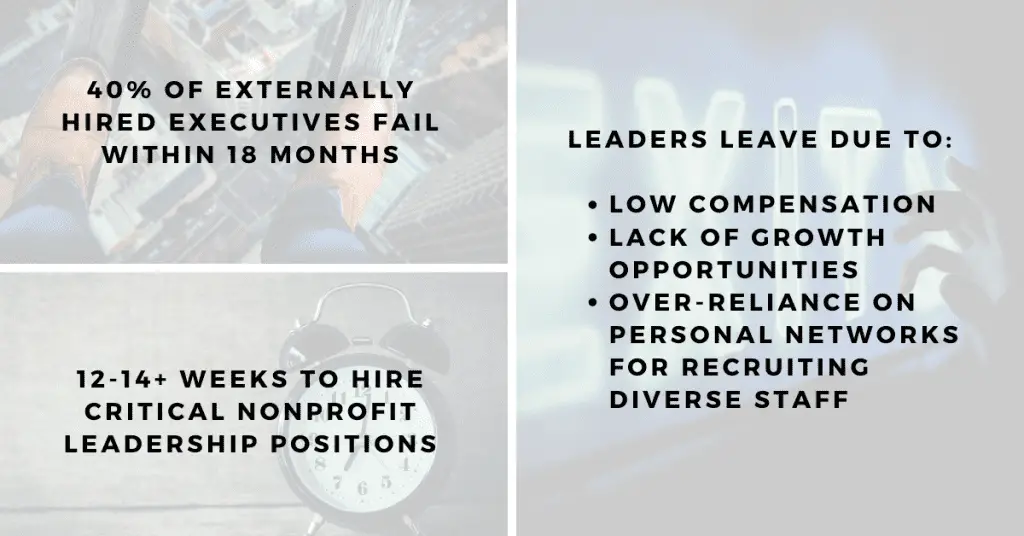
What are the top nonprofit leadership skills?
The leadership skills needed in a nonprofit closely align with other industries. Leadership is a combination of hard and soft skills learned over time.
We’ve identified eight nonprofit leadership skills that are a must for senior and executive-level leaders.
Financial Management:
Balancing the financial realities of a nonprofit with a positive social impact is not easy.
By the very nature of their work, nonprofits operate on thin margins and tight budgets.
Nonprofit organizations are entrusted, for some, with public funds or private philanthropic dollars. Maintaining this trust with the financial resources provided is critical.
Fundraising:
No matter where the funding comes from, fundraising is almost always a requirement.
While many nonprofit leaders may not like fundraising, many others see it as an opportunity to serve the donors. We’ve come to call them investors.
Fundraising is about relationships. Nonprofit leaders need to be able to build and sustain relationships for the long term.
Simultaneously, an understanding of fundraising events, foundations and grants, online and offline marketing, and nonprofit development is fundamental.
(Side note: We like Development 101: Building a Comprehensive Development Program on Biblical Values)
Human Resource Stewardship:
Every organization needs to manage people.
Stewardship of the people serving your constituency is critical to organizational growth and increased nonprofit impact. It goes beyond employees and includes volunteers and even external contractors and partners.
The nonprofit leader must know how to task the right people to the right things and ensure fair and equitable accountability.
Leaders must know, understand, and work hard to match the community’s diversity and bring cultural competencies. Emotional Intelligence is a critical ingredient.
Leading and managing change throughout the organization is vitally important, given the rapid rate of change experienced in high-growth, entrepreneurial nonprofits.
Planning:
Real growth in a nonprofit takes place through the execution of an efficient, effective, and well-communicated plan.
Great nonprofit talent needs to see a path toward helping more people, changing a system, achieving a positive outcome that grows over time.
Nonprofit strategy, framework knowledge, and planning skills are of significant importance. Of course, a track record of successful plan execution is the only way to move an organization forward.
Capacity/Systems Building:
Nonprofit leaders must be able to transition from doer to implementer. They need to have the ability not to get dragged into the details when others on the team are capable.
It’s about fighting for simplicity, clarity, and accountability. It is this ability to create and implement systems that allow for fast growth and increased impact.
Program Knowledge:
For example, youth mentoring requires some knowledge about youth development needs, ways to positively impact change through social-emotional learning (SEL), and the challenges faced by single parents.
Nonprofit leaders are seeking to make a positive difference in a particular area of need. Your leaders need to have working knowledge in the area you serve or have transferable experience. If they don’t have it, you must teach it.
The leader does not need to know the ins and outs of every front line role. Instead, they must understand at a level that earns trust and provides insight for decision making and building systems.
Governance:
Executive and senior nonprofit leaders will interact with board members, partners, and outside professionals.
They should understand the differences between policy and operational board of directors and be capable of managing those interactions well.
Since the IRS mandates, every nonprofit must have a board of directors, learning how to partner with the board is a nonprofit leadership training requirement.
Community Relations and Communication
Like it or not, nonprofit leaders need to be comfortable presenting in front of big and small groups.
Whether a lunch with a prospective donor or interacting with a group of concerned community leaders, building relationships is core to nonprofit success.
Nonprofit leaders are the face of the organization in the communities we serve. We must be visible in our communities.
Can we create our nonprofit leadership development program?
Yes! Nonprofits should be intentionally developing their leaders. It’s not optional.
Leadership development includes the Board and Executive Director or President. We’ve worked with boards that have a professional development section of their regular meeting agenda.
Again, be intentional.
Nonprofit sector leadership development takes three forms.
- On the job learning (Teach and challenge)
- Coaching and mentoring (Internal or external)
- Classroom education (Leadership training)
These forms follow a popular and time tested framework for nonprofit leadership development, the 70-20-10 learning and development model.
You might ask about personal research, reading and self-development. We consider this a needed component of all three of the above leadership development forms.
The information from the BridgeSpan Group on this topic is quite good. Nonprofit Leadership Development: What’s Your “Plan A” for Growing Future Leaders? is your primer for doing nonprofit leadership development. Consider it a must-read.
No matter how you do it, be intentional about nonprofit leadership development, and commit funding to your nonprofit organization’s future.

Are there grants to cover nonprofit leadership training?
Another yes!
Let’s start with Foundation partnerships like the All State Foundation. The All State Foundation Nonprofit Leadership Center has partnered with Northwestern University Kellogg School of Management’s Center for Nonprofit Management to offer an online nonprofit leadership development program. Best of all, it is free to nonprofit organizations. They cover the cost.
If you are in a community served by the Taproot Foundation, there may be opportunities for pro-bono leadership development or underwriting expenses.
The Durfee Foundation understands capacity building. They provide sabbatical grants for up to six individuals stipends and expenses of up to $40,000 to travel, reflect, or otherwise renew themselves in whatever manner they propose. While this grant is for nonprofit leaders in the Los Angeles area, it is an exciting idea. The peer placement component helps build succession skills.
The Robert Wood Johnson Foundation has the Culture of Health Leaders program. If selected, you will grow your knowledge, experience, and network.
The Foellinger Foundation specifically funds grants for capacity-building programs. Now, they only support type 509 nonprofits in Allen County, Indiana. However, they are an example of foundations who really get the need to build internal strength.
The Community Memorial Foundation provides capacity building grants that may be helpful in Leadership development initiatives.
We would suggest that you reach out to foundations you already partner with and ask them about capacity building as part of your next LOI.
Finally, significant investors in your nonprofit that own businesses will get it. Ensure whoever is doing major gift fundraising is aware of your need, the dollars requested, and the impact the program will have. A successful business will know the power of building internal strength.
Are there nonprofit leadership certificates to get?
Yes, there are certificates in nonprofit leadership that can increase professional development. Depending on the area of focus, there are specific options for you and your team.
While nonprofit leadership certificates can demonstrate knowledge gained, these do not replace experience. Creative problem solving is a must, and experience in other markets challenges the status quo.
Having a solid educational foundation will pay dividends in the long run.
Check with local colleges and universities for some cost-effective certificate programs.
For instance, the Center for Nonprofit Studies at Austin Community College in Texas offers five nonprofit certificate programs.
- Nonprofit Leadership and Management
- Effective Fundraising
- Nonprofit Financial Management
- Volunteer Management
- Grant Writing
If you have the budget and a more traditional university approach is what you seek, look at the Executive Certificate in Nonprofit Leadership from the Kennedy School at Harvard or Duke. Perhaps the Lead program at Stanford is more your style.
There are nonprofits serving nonprofits with leadership development—for instance, CFRE. With a fundraising focus, the ANSI accredited Certified Fund Raising Executive (CFRE) certification might be a target on your leadership development plan. (Pun fully intended.)
For Christian ministries, the Credentialed Christian Nonprofit Leader (CCNL) might be of interest thru the Christian Leadership Alliance.
BoardSource has the Certificate of Nonprofit Board Education that can be beneficial to nonprofit leaders and board members.
Conclusion
There is a deficit in nonprofits when it comes to leadership development, training, and succession planning.
Create an intentional plan to develop leaders in your nonprofit. Use the 70/20/10 leadership development model.
Invest in leadership training. Some foundations are willing to cover expenses when it means increased sustainability.
Don’t forget to talk with your investors, whether foundations or major donors. They will likely understand the benefit of investing in developing nonprofit leaders.
Keep reading and check out our list of more than 40 of the best nonprofit books to continue your leadership development.
Compensation questions coming up? Be ready.
Whether it is a board review, a new hire, an audit, or someone browsing your 990 – ExemptPay helps you respond with data. Explore free salary benchmarks from 3M+ Form 990 records, then generate a Board Confidence Report with peer group analysis and minutes-ready language your board can act on.
Additional Resources
- https://hbr.org/2014/01/for-senior-leaders-fit-matters-more-than-skill
- https://ssir.org/articles/entry/the_nonprofit_leadership_development_deficit#
- https://blueavocado.org/hr-and-employment-issues/how-to-hire-great-nonprofit-leaders/
- https://www.bridgespan.org/insights/library/transition-to-the-nonprofit-sector/transferable-skills
- https://thirdsectorcompany.com/academies/
- https://ssir.org/articles/entry/five_nonprofit_leadership_development_facts
- https://www.bridgespan.org/insights/library/leadership-development/the-70-20-10-leadership-development-model


